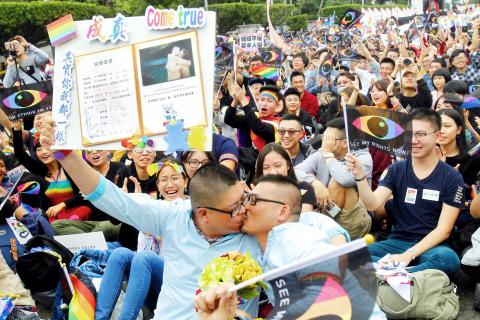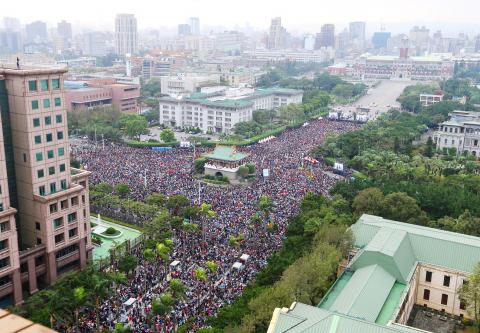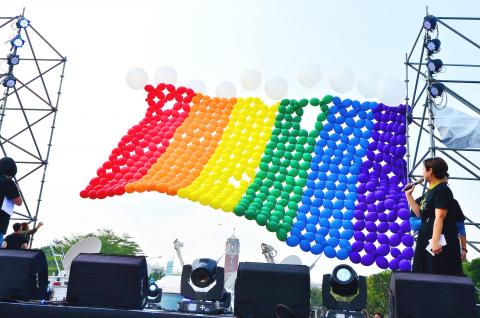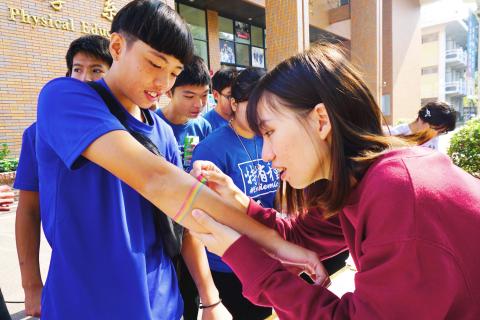More than 200,000 people yesterday gathered for a public concert on Ketagalan Boulevard in Taipei in support of same-sex marriage.
The concert, which had a theme of supporting equal marriage rights and preventing deaths caused by discrimination against gay people, coincided with Human Rights Day, the concert’s organizers said.
More than 20 artists took to the stage to express solidarity with supporters of same-sex marriage, including Hong Kong musician and pro-democracy advocate Denise Ho (何韻詩).

Photo: AP/Chiang Ying-ying
TV host Belle Yu (于美人) made an appearance onstage and tossed a bouquet to the crowd and wished gay couples luck in their bid to become legally united, while singers Kenji Wu (吳克群) and Aaron Yan (炎亞綸) joined the crowd to show their support.
Shortly after the event began, organizers flew a large rainbow flag made of balloons in front of the Presidential Office Building as a message to President Tsai Ing-wen (蔡英文) regarding the public’s demand to legalize same-sex marriage.
Legislators across party lines attended the event to show their support, while participants holding up fliers and flowers chanted: “No Civil Code amendments, no end to discrimination.”

Photo: CNA
The organizers said that the crowd started to gather at 1pm and reached at least 200,000 people at about 4pm, spanning 4km.
The crowd cheered when Democratic Progressive Party (DPP) Legislator Yu Mei-nu (尤美女), who in October proposed the bill to amend the Civil Code, took to the stage to make a speech.
Same-sex marriage is a lofty dream, Yu said, adding that the ongoing legislative process is like mountaineering: The peak is in sight, but it does not always mean the road ahead will be easy.

Photo: Wang Yi-sung, Taipei Times
Yu said that she and her colleagues at the legislature’s Judiciary and Organic Laws and Statutes Committee would clear committee reviews of three draft bills aimed at legalizing same-sex marriage, which are scheduled for Dec. 26.
However, as the end of the legislative session nears, a bill might not be passed until June, following cross-caucus negotiations, she said, urging the public to use this time to engage in rational discussions on gay marriage.
All five members of the New Power Party (NPP) legislative caucus also attended the event to show their support.

Photo: Tsai Shu-yuan, Taipei Times
Love is what unites all the participants at the event and NPP legislators are just like any other people in the crowd who want equal marriage rights, justice and love, NPP Executive Chairman Huang Kuo-chang (黃國昌) said.
“I believe that we will succeed if we continue on this path,” he said.
Chinese Nationalist Party (KMT) legislators Ko Chih-en (柯志恩), Chiang Wan-an (蔣萬安) and Jason Hsu (許毓仁) also voiced their support for same-sex marriage in pre-recorded videos, with Chiang and Hsu saying they are in favor of amending the Civil Code.
Presidential Office spokesman Alex Huang (黃重諺) said that Tsai supports marriage equality and believes that gay people have the right to marriage.
“With regard to the draft bills, they are being discussed in the legislature. We welcome and look forward to more dialogue and a higher level of tolerance in society to better safeguard the rights of gay people,” Alex Huang said.

DAREDEVIL: Honnold said it had always been a dream of his to climb Taipei 101, while a Netflix producer said the skyscraper was ‘a real icon of this country’ US climber Alex Honnold yesterday took on Taiwan’s tallest building, becoming the first person to scale Taipei 101 without a rope, harness or safety net. Hundreds of spectators gathered at the base of the 101-story skyscraper to watch Honnold, 40, embark on his daredevil feat, which was also broadcast live on Netflix. Dressed in a red T-shirt and yellow custom-made climbing shoes, Honnold swiftly moved up the southeast face of the glass and steel building. At one point, he stepped onto a platform midway up to wave down at fans and onlookers who were taking photos. People watching from inside

A Vietnamese migrant worker yesterday won NT$12 million (US$379,627) on a Lunar New Year scratch card in Kaohsiung as part of Taiwan Lottery Co’s (台灣彩券) “NT$12 Million Grand Fortune” (1200萬大吉利) game. The man was the first top-prize winner of the new game launched on Jan. 6 to mark the Lunar New Year. Three Vietnamese migrant workers visited a Taiwan Lottery shop on Xinyue Street in Kaohsiung’s Gangshan District (崗山), a store representative said. The player bought multiple tickets and, after winning nothing, held the final lottery ticket in one hand and rubbed the store’s statue of the Maitreya Buddha’s belly with the other,

‘COMMITTED TO DETERRENCE’: Washington would stand by its allies, but it can only help as much as countries help themselves, Raymond Greene said The US is committed to deterrence in the first island chain, but it should not bear the burden alone, as “freedom is not free,” American Institute in Taiwan Director Raymond Greene said in a speech at the Institute for National Defense and Security Research’s “Strengthening Resilience: Defense as the Engine of Development” seminar in Taipei yesterday. In the speech, titled “Investing Together and a Secure and Prosperous Future,” Greene highlighted the contributions of US President Donald Trump’s administration to Taiwan’s defense efforts, including the establishment of supply chains for drones and autonomous systems, offers of security assistance and the expansion of

STREAMLINED: The dedicated funding would allow the US to transfer equipment to Taiwan when needed and order upgraded replacements for stockpiles, a source said The US House of Representatives on Thursday passed a defense appropriations bill totaling US$838.7 billion, of which US$1 billion is to be allocated to reinforcing security cooperation with Taiwan and US$150 million to replace defense articles provided to the nation. These are part of the Consolidated Appropriation Act, which the US House yesterday passed with 341 votes in favor and 88 against. The act must be passed by the US Senate before Friday next week to avoid another government shutdown. The US House Committee on Appropriations on Monday unveiled the act, saying that it allocates US$1 billion for the Taiwan Security Cooperation Initiative